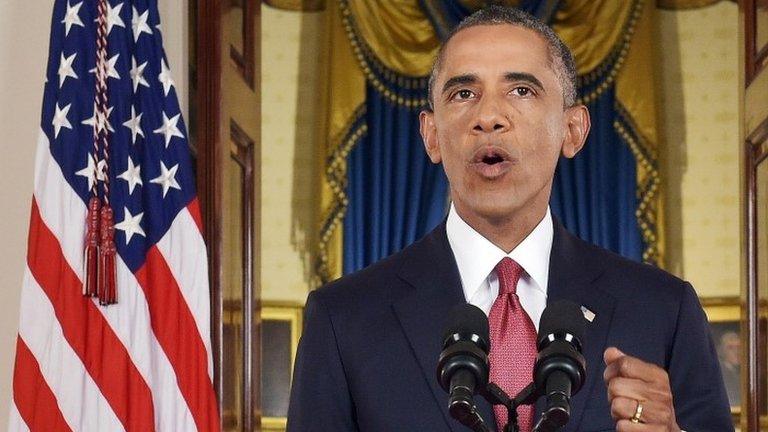Islamic State crisis: A speech Obama hoped to avoid
- Published
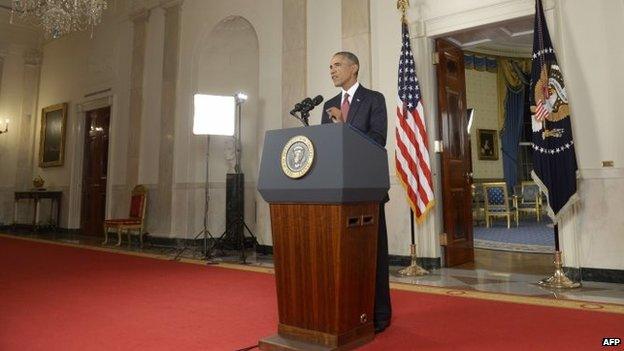
Obama gave a speech one can imagine he had been desperately hoping to avoid
Sometimes a president is defined by what he stands for.
Sometimes a president is defined by what he doesn't.
In the field of foreign policy and military action, it feels as though the 44th president of the US is defined by what he isn't.
Barack Obama came to power pledging to bring American troops home from foreign conflicts. He said last year that Syria had crossed a red line but then did nothing.
This is a man who does not want to be a war leader. Bellicose is not a word that attaches to Mr Obama. And you can imagine that the address he gave the American people from the State Floor of the White House was something he had been desperately hoping to avoid.
So it was not surprising that in the first paragraph of his speech he made a point of talking about the 140,000 troops that had been brought back from Iraq and the drawing down of forces in Afghanistan.
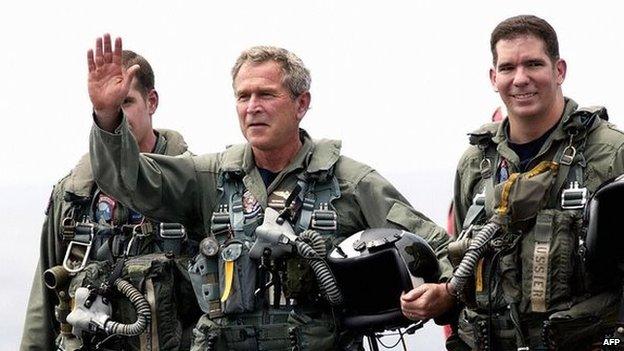
Bush prematurely declared "mission accomplished" in Iraq - who knows whether or when Obama will
But then he had to deal with the unpalatable situation that he now finds, and so for the first time Islamic State (IS) targets on the ground in Syria will be in the crosshairs of American pilots.
The president in his address told the American people: "I have made it clear that we will hunt down terrorists who threaten our country, wherever they are. That means I will not hesitate to take action against [IS] in Syria, as well as Iraq. This is a core principle of my presidency: if you threaten America, you will find no safe haven."
But he was equally emphatic that the combat on the ground would happen without US troops. Instead, the US will ramp up its military assistance to the Syrian opposition, and he called on Washington lawmakers to find the means to make this happen: "I again call on Congress to give us additional authorities and resources to train and equip these fighters. In the fight against [IS], we cannot rely on an Assad regime that terrorises its people; a regime that will never regain the legitimacy it has lost."
The Syrian opposition, he insisted, would be the best counterweight to Islamic State.
But the president was also at pains to express what this was not. There would be no American boots on the ground.
"We will not get dragged into another ground war," the president insisted.
"I want the American people to understand how this effort will be different from the wars in Iraq and Afghanistan. It will not involve American combat troops fighting on foreign soil. This counter-terrorism campaign will be waged through a steady, relentless effort to take out [IS] wherever they exist, using our air power and our support for partner forces on the ground."
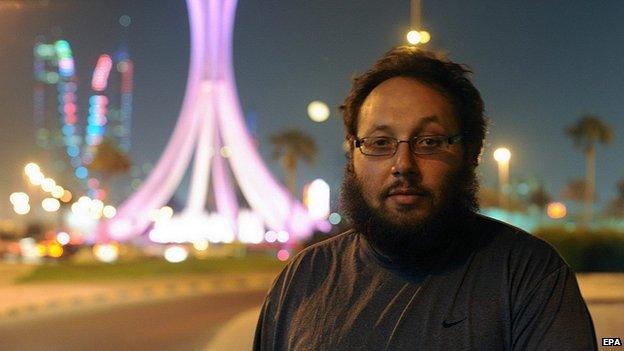
The IS murder of Steven Sotloff, shown in Bahrain in 2010, changed something for the US public
To put this in management consultant-speak, America is outsourcing the ground offensive to local forces, thereby minimising the risk of American casualties.
He said that the US would lead a broad coalition to roll back this terrorist threat - but underlined that America would not be acting alone.
"American power can make a decisive difference, but we cannot do for Iraqis what they must do for themselves, nor can we take the place of Arab partners in securing their region," he said.
When Mr Obama came to power, he led a nation that had grown weary of the drawn-out conflicts in Iraq and Afghanistan.
He rode a popular wave and even at the beginning of this year, when he gave his State of the Union address, that was still a major theme. America needed to avoid "open-ended conflicts", to "give diplomacy a chance to succeed". He pledged to put an end to the United States on a "permanent war footing".
But something changed with the beheading of those two American journalists James Foley and Steven Sotloff.
President Obama: "We will degrade and ultimately destroy" IS
American public opinion shifted quickly. To change the metaphor from surfing to curves, the president now found himself well behind the curve. He talked about containing Islamic State.
The American people demanded action. Two weeks ago he said he had no strategy. The American people told him to go and get one.
Opinion polls came up with two interesting findings. One, the American public wanted military action - a very different situation from a year ago. And secondly, they felt the president had been too cautious, and his approval ratings on foreign affairs slumped.
And so to the address to the nation. Action is going to start; who knows when it will be "mission accomplished", as President George W Bush famously and inaccurately declared over Iraq.
One other instructive comparison between those two presidents. Mr Bush characterised the start of the invasion of Iraq as "shock and awe". This president merely promises "steady and relentless".
All the American people care about is that the threat is dealt with. And - maybe reluctantly - that is the task the president is now undertaking.
You can follow Jon Sopel on Twitter @BBCJonSopel, external
- Published10 September 2014
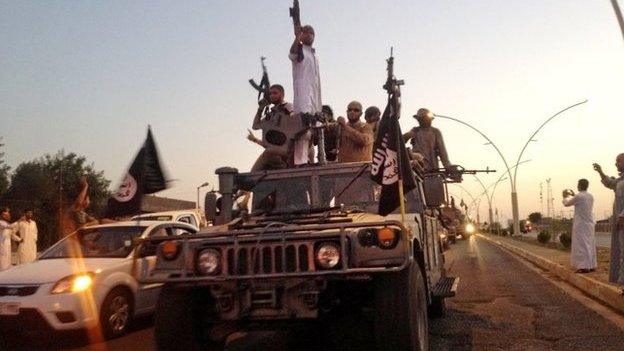
- Published11 September 2014
